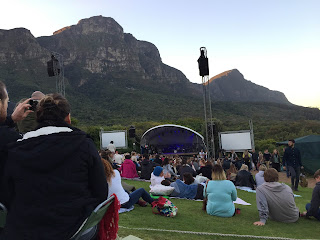This past Thursday night many of us
attended an Of Monsters and Men concert at Kirstenbosch Gardens. Most of us
knew about this band and were fans prior to coming to Cape Town and were really
excited to see that they would be at one of our favorite venues. We got there a
bit early and had a good amount of time to relax and look around. South Africa
is majority black and minority white. The concert was vast majority white and
minority black, as is the suburb we live in, Rondebosch. The concert proved how
socio-economic wellbeing is still largely determined by race in South Africa
but we had already seen that throughout our experience here.

What struck me about the white South
Africans at the concert was how they tried to compensate for this; how their
image clearly reflected some level of inner conflict over this. Even the
discussions that I would casually eavesdrop on proved this. Everyone was
dressed very much like a hipster. Hipster subculture values social justice,
fair trade, environmental sustainability, and other causes along those lines.
Many people who claim to be part of this culture do a lot of talking and not
very much acting. Frequently striving for this image seems to be in a response
to recognizing their privilege but not knowing what to do about that privilege
or how they can act to dismantle unfair and inequitable social structures that
may unfairly benefit them (which is funny because as a result hipster culture
has come to embody privilege). This was very clearly the case for many of the
white South Africans at the concert. They recognized there was something wrong
with how their race helped them immensely in life but they were not ready to
say goodbye to these advantages.
I am not condemning them. In the
United States it is very similar, whether someone is trying to be a hipster or
not. White people don’t like to admit that their whiteness is an advantage in
the U.S.. Men don’t like to admit that their sex is an advantage in the U.S..
Heterosexual people don’t like to admit that their sexuality is an advantage in
the U.S.. I belong to all of these categories and have definitely fallen victim
to this denial in my life as well. It is just interesting in South Africa,
where the inequalities are significantly more apparent then in most cases in the
U.S., that the denial still exists and that you still see people fully
embracing their privilege even after they recognize that their privilege was
the result of the hardship of the majority in South Africa.
At one point during the show we were
at the front, right next to the stage, and an announcer came out. He was a
white man and had the word “pride” tattooed into his forearm. I do not pretend
to know what the meaning behind his tattoo was and there may be a very good
meaning. My co-educators who also saw this and I, thinking of him as a
projection of the privileged group of white males in South Africa, thought that
it was an interesting choice of words and that everyone should think about what
they are truly proud of and if those things we place our pride in are in any
way a result of our privilege.


No comments:
Post a Comment